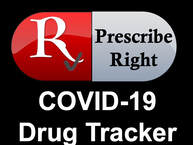|
COVID-19 Vaccines
An interim analysis of data from 11,636 patients participating in four trials (NCT04324606, NCT04400838, NCT04444674, ISRCTN89951424) evaluating AstraZeneca’s COVID-19 vaccine (AZD1222 or ChAdOx1 nCoV-19) found the average efficacy for two dosing regimens of the vaccine to be 70% in preventing COVID-19. Giving a half dose as the first immunization and a full dose four weeks later resulted in 90% efficacy (n=2,741), while giving a full dose at both immunizations resulted in 62% efficacy (n=8,895). No safety issues were found. A preprint draft of a further interim analysis of the four AZ trials (NCT04324606, NCT04400838, NCT04444674, ISRCTN89951424) included 17,177 patients, with 332 developing COVID-19. The analysis found overall efficacy to be 66.7% two weeks or more after the second dose. Vaccine efficacy was 63.1% in patients that received two full doses of the vaccine and 80.7% in patients that received a half dose initially, followed by a full dose for the booster. A single dose of the vaccine demonstrated efficacy of 76% for 90 days in the prevention of symptomatic infection but did not offer protection for asymptomatic infection. Overall, efficacy was 67% with a single dose. Patients that received a second dose of vaccine at 12-weeks (instead of 4-weeks) had antibody titers 2-fold higher with 82.4% efficacy. There were no COVID-19 hospitalizations in the vaccine group, compared to 22 in the placebo group. In a 151 patient, Phase I Australian trial (NCT04405908), Clover’s protein-based COVID-19 vaccine candidate was combined with GSK’s vaccine adjuvant, ASO3 in one cohort and Dynavax’s vaccine adjuvant, CpG 1018 in another cohort. Both vaccines boosted with an adjuvant elicited antibody titers higher than a panel of recovered COVID-19 patients in all age groups. The vaccine without an adjuvant elicited minimal antibody response. The ASO3 adjuvant elicited a higher neutralizing response, but also a higher incidence of adverse events. Clover plans to initiate a Phase II/III trial to evaluate the safety and efficacy of SCB-2019 in combination with Dynavax’s vaccine adjuvant, CpG 1018, in the first half of 2021. The trial is sponsored by CEPI. Clover and GSK discontinued development of Clover’s COVID-19 vaccine in combination with GSK’s vaccine adjuvant, ASO3. GSK will manufacturer up to 100 million doses of CureVac COVID-19 vaccine candidate CVnCoV. GSK and CureVac will also develop a multi-valent vaccine to offer broader protection against COVID-19 mutations. The companies are targeting 2022 for the multi-valent vaccine to be available. Pfizer and BioNtech are receiving help in manufacturing their vaccine. Sanofi agreed to manufacture 125 million doses in a German plant for use in European countries and Novartis has agreed to fill vaccine vials at a Swiss plant. In order to increase vaccine capacity, Moderna, has asked the FDA to approve putting 15 doses in each vial. The same vials are currently filled with 10 doses. Interim results from 21,977 patients enrolled in the 40,000 patient, Russian, Phase III (RESIST) trial (NCT04530396), found that two doses of the Sputnik V vaccine given 21 days apart resulted in 91.6% efficacy based on 78 cases of COVID-19 that developed in the study population (16 cases in the vaccine group vs 62 in the placebo group). The trial population was almost all white, 11% were over 60 and almost 25% had a risk factor for severe disease. Efficacy was stable across all age groups. The most common adverse effects were flu-like illness, injection site reactions, headache, and asthenia. An unpublished and unedited study compared the increase in antibodies for SARS-CoV-2 in seropositive COVID-19 patients to uninfected volunteers. Seropositive patients developed antibody titers that were ten times higher after one dose of Moderna’s or Pfizer’s vaccine compared to the antibody levels attained by the volunteers after two doses. The seropositive patients also had a higher incidence of adverse effects. COVID-19 Anti-Inflammatories French researchers retrospectively examined the results after 7-days in 111 children that progressed to multisystem inflammatory syndrome (MIS-C) from a COVID-19 infection. Fever persisted in 9% of patients that received IVIG and methylprednisolone compared to 51% in the IVIG only group. NIH found insufficient evidence to recommend either for or against the use of tocilizumab or sarilumab for the treatment of COVID-19 in patients who are within 24 hours of admission to the ICU and who require invasive or noninvasive mechanical ventilation or high-flow oxygen, however some members of the advisory panel would administer a single dose of tocilizumab (8 mg/kg of actual body weight, up to 800 mg) in addition to dexamethasone to these patients. NIH recommends against the use of interleukin-6 (IL-6) inhibitors (tocilizumab, sarilumab, siltuximab) for the treatment of COVID-19 patients that do not require ICU-level care or are beyond 24 hours of admission to the ICU even if they require invasive or noninvasive mechanical ventilation or high-flow oxygen. The NIH panel did not exclude use of an IL-6 inhibitor as part of a clinical trial. Comments are closed.
|
Stay informed, subscribe to the Prescribe Right Pharmaceutical Pipeline Tracker
Archives
January 2023
Categories |
Services |
Company |
Support |
© COPYRIGHT 2015. ALL RIGHTS RESERVED.
|


 RSS Feed
RSS Feed